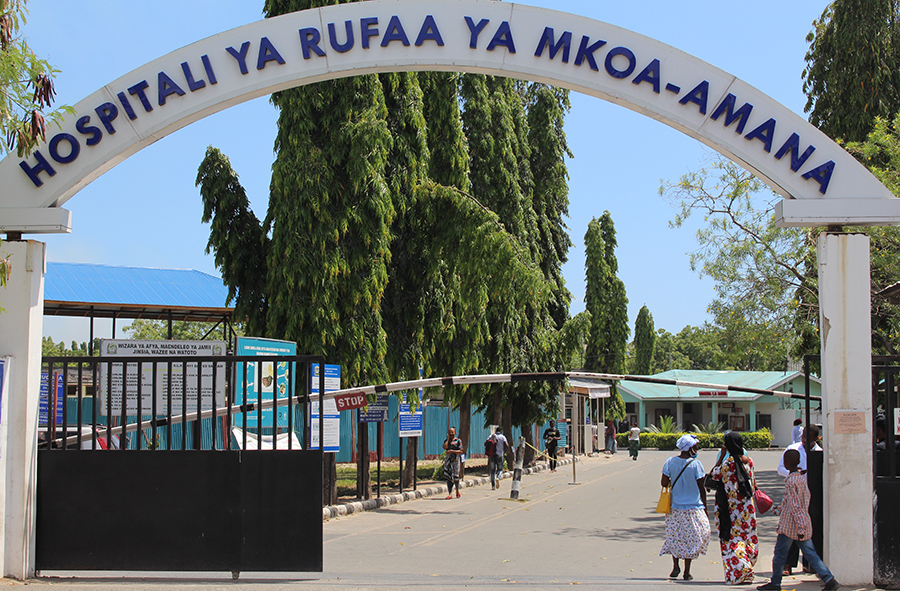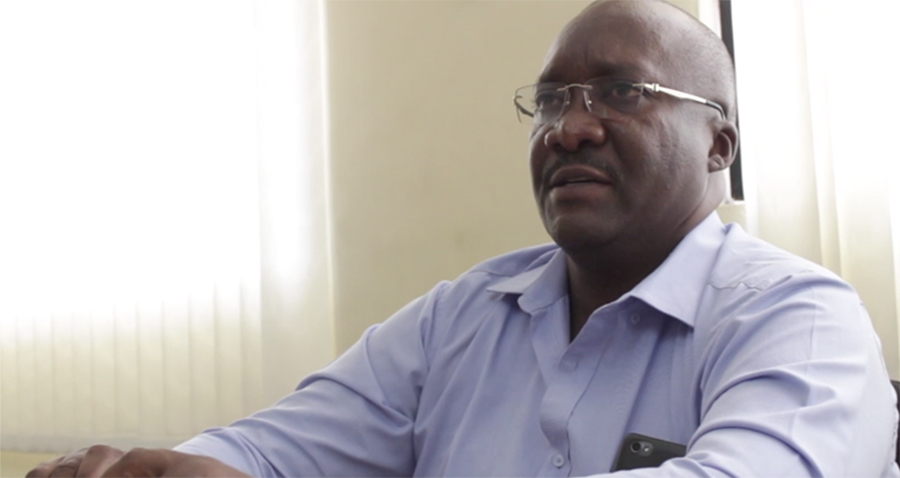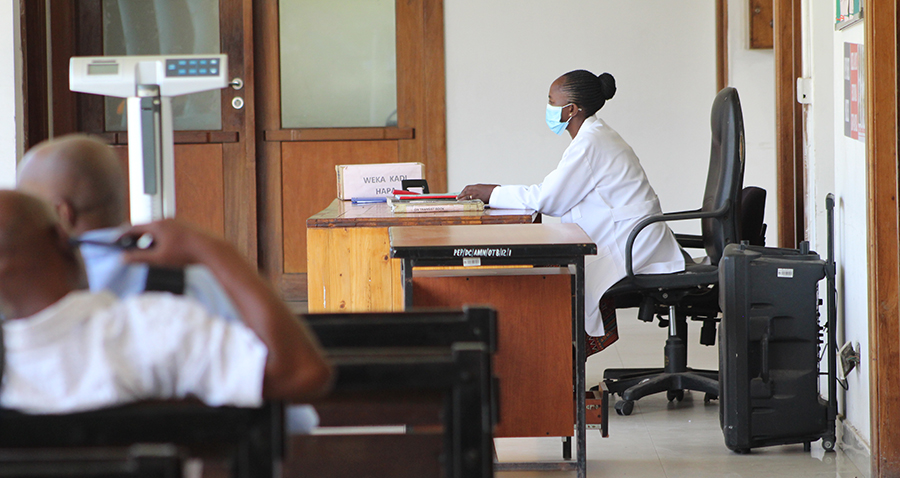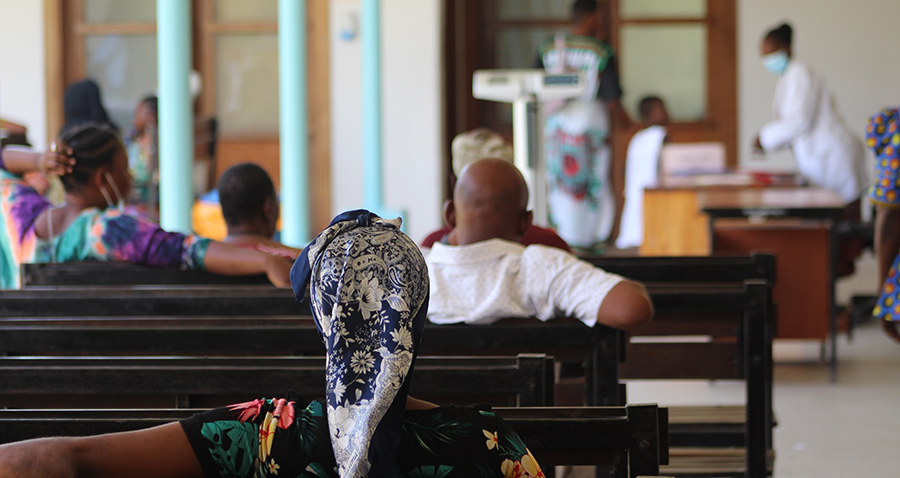Fear, Action and Success: The Story of Amana Hospital
Summary
- In April 2020, Tanzania designated Amana hospital a COVID-19 treatment center. The hospital was forced to stop all routine operations, including HIV care.
- CDC worked with the Ministry of Health, Community Development, Gender, Elders and Children, and partner organization Management and Development for Health (MDH), to protect the health of HIV-positive patients.

Patients crossing the entrance gate of Amana Regional referral hospital, the main public hospital in Ilala Municipal, Dar es Salaam. It is among the earliest HIV care and treatment centers in Tanzania, currently serving over 6,500 clients with funding from US Centers for Disease Control and Prevention. Photo by Amiri Said/Management and Development for Health (MDH).
“It all happened so quickly. We were afraid we would lose track of our HIV-positive clients,” remembered Dr. Immaculata Kessy, the District Clinical and Strategic Information Manager for Ilala Municipal Council in Tanzania. The day was Friday, April 17, 2020; and the Government of Tanzania designated Amana Hospital a COVID-19 treatment center in the heart of Dar es Salaam City. Routine facility operations had to stop immediately, including HIV care and treatment services. Fear, and uncertainty arose.
Quick Action to Protect HIV-Positive Clients
“As a team, we had to make urgent alternative arrangements for our patients on antiretroviral drugs. It was not an easy task but doable” said Dr. Shany Mwaluka, the site manager for Amana care and treatment center (CTC). Amana is among the first antiretroviral therapy (ART) clinics in the country serving more than 6,700 HIV-positive clients as of March 2020 and supporting an average of 300 HIV patients daily.
To ensure continuity of care, initiatives to safely redirect HIV-positive clients to other health facilities were implemented by the US Centers for Disease Control and Prevention (CDC) supported by partner Management and Development for Health (MDH) in collaboration with Government of Tanzania Regional, Council and Facility Health Management teams. Dr. Ayoub Kibao, Regional AIDS Control Coordinator, was at the heart of efforts and committed to ensure continuation of services for people living with HIV.

Dr. Ayoub Kibao is the Regional AIDS Control Coordinator in Dar es Salaam, and has been supporting HIV clients since PEPFAR started in 2004. Dr. Kibao was an important figure to support HIV service delivery at the start of, and throughout, the COVID-19 pandemic. Photo by Lameck Machuma/Management and Development for Health (MDH).
CDC, MDH, and health officials informed HIV-positive clients of the facility closure and started working on solutions. The partners:
- developed strategic interventions to maintain services
- prepared alternative facility and community service delivery points to receive new clients
- relocated health provider resources to ensure efficient service delivery and proper health reporting during this change
MDH identified HIV clients scheduled to visit the clinic in the next five days. Nurses let clients know that Amana CTC was closed and explained how to seek care at an alternative site. Signs were also posted at the facility to inform and redirect clients to alternative care locations.
In partnership with regional and council health management teams (R/CHMTs), CDC and partners worked to assess and prepare alternative facilities and community sites for the expected influx of clients. The preparations included:
- increasing the number of staff
- improving the space and client flow
- relocating computers to facilitate data entry
- creating temporary files for relocated clients
Differentiated Service Delivery at Amana Hospital

A health care provider attending clients at a care and treatment clinic at Amana Hospital. Amana Hospital has consistently provided high quality services for more than 15 years. Photo by Amiri Said/Management and Development for Health (MDH).
To ensure uninterrupted care and prevent overcrowding at facilities, all HIV clients eligible for three and six months of drug dispensing were identified and provided medication.
Multi-month dispensing (MMD) provides HIV clients with a larger supply of their prescriptions to reduce the frequency of visit to health facilities. As a result, there was a significant increase in the number of clients receiving three to six months of HIV medication. MDH also worked with CDC supported community partners to scale up the delivery of ART to HIV clients within communities. Mobile ART dispensing vans were placed outside the hospital to serve clients who were unaware of the closure.
By May 5, 2021, among 3,921 HIV clients expected to visit Amana Hospital, 80% (3,121) received care and treatment services at alternative clinics. Clinical teams effectively tracked 1,430 clients who missed visits and successfully returned 53% to care and treatment services over the two-and-a-half-week period.
Regional Success
The Amana Hospital adapted to unforeseen obstacles and showed the success of the three to six-month distribution of HIV medications through the MMD roll out in Dar es Salaam.

Waiting area at the Amana Hospital HIV care and treatment clinic. MDH through CDC funding consistently supports interventions that improve care and quality of life for people living with HIV. Photo by Amiri Said/Management and Development for Health (MDH).
Prior to the COVID-19 pandemic in 2020, the goal was to scale up access and monitoring of HIV treatment for patients. In Dar es Salaam, the number of clients receiving six-month drug dispensing was only 4.61% in February 2020. Through innovative interventions within health facilities and communities, and despite constraints of COVID-19, this number increased to 86.12% in Dar es Salaam by July 2020.
These positive results allowed for the expansion of this model across regions of Tanzania based on the strong partnership between CDC, the Ministry of Health, Community Development, Gender, Elders and Children, and partners.